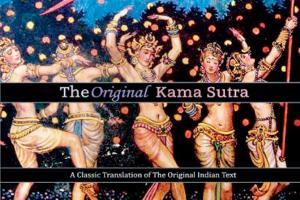Enough of the politically motivated brouhaha every Valentine's Day, let's rechristen the day and propagate our rich heritage instead

Vatsyayana's Sanskrit treatise is the worldu00c3u00a2u00c2u0080u00c2u0099s most famous book on love and sexuality
 My aunt recently complained to my mother, who is visiting, about Valentine's Day. I silently listened to her mention how youngsters gift each other cards and flowers, and how this day was unknown when they were young, etc, etc.
My aunt recently complained to my mother, who is visiting, about Valentine's Day. I silently listened to her mention how youngsters gift each other cards and flowers, and how this day was unknown when they were young, etc, etc.
My silence lasted all of five seconds. I tired of my aunt's propaganda (she is a longtime fan of Sushma Swaraj and her grouse against Modi, who she otherwise admires for being unabashedly anti-Muslim, is that he has repressed Sushma), and suggested a solution: that she campaign to rename Valentine's Day as Kamasutra Diwas. After all the Kamasutra was around when she and my mother were girls.
ADVERTISEMENT
They were chagrined and embarrassed. My father continued eyeing a plate of biscuits on the coffee table, while my uncle concentrated on his smartphone, checking WhatsApp (my aunt and her husband stopped the newspaper several years ago as it was an "unnecessary" expense, and they get their news from the usual dubious networks of fake news). My wife was not there to scold me, even if for appearance's sake.
Valentine's Day is not a terrible curse or grave threat to our culture. My mother, who has lived abroad since 1965 and is familiar with the commercialised day, wondered when it became a big deal in India. Presumably around the first gulf war, in 1990 – the time that satellite TV entered India. (five-star hotels in Delhi had immediately set up satellite TV in their bars to show us live coverage of American high-tech pyrotechnics in the wake of the crumbling of the Soviet Union.) The gulf war ended but MTV stayed on, leading to the widespread use of figure-hugging jeans (till then, the few brave girls who wore jeans used to pull their shirts over their hips with true Indian humility), and subsequently, the annual St Valentine's Day.
My aunt fanatically derided the influence of western culture on our youth. It was fairly hypocritical. When I was a high-schooler in New York, yoga did not exist (or, at least, it was unknown in popular culture). Now, various types of yoga are ubiquitous in America from coast to coast, with many fraudulent guru types seeking to patent their practice (inevitably some of these gurus end up facing an avalanche of allegations of rape, etc). To patent yoga is ridiculous – it would be like trying to patent baptism or circumcision.
Similarly, when I was a teenager, there were only some high-end Indian restaurants in Manhattan, which made our food (basically, north Indian food) an exclusive dining experience. When I was in high school in lower Manhattan, a row of Bangladeshi restaurants opened in Greenwich Village that made Indian food accessible to students and others with modest budgets. Now, Indian food is so familiar that Hollywood films occasionally reference the samosa (though samosas anywhere in America taste the worst).
The point is that when cultures interact, there is always an exchange of influences. The spread of religions and religious cultures in Asia has often followed trade. Didn't Mahatma Gandhi say that our culture was like a house whose windows should be opened to allow fresh air to blow through? Before liberalisation we did not have much western influence (or even Soviet influence, for that matter, though people around the Third World were enjoying Raj Kapoor's movies), but we also didn't have much affluence or even telephones, etc. Dr Manmohan Singh, as Narasimha Rao's finance minister, took a conscious decision to liberalise the economy, citing South Korea's rapid development (it was economically at par with India in 1950, but is now miles ahead). With liberalisation we had to expect things like Valentine's Day and twitter to reach us.
Any opposition to Valentine's Day is basically a way to scare people the way that "Love Jihad" does though its occurrence is statistically a rarity in a population of 125 crore; it is merely a method of political mobilisation. The Shiv Sena used to be the ones harassing florists and couples in parks; since 2014, vigilante groups of unemployed youngsters have mushroomed and adopted the cause, with impunity, especially in BJP-ruled states. It's not much different from the way the BJP is trying to harass twitter, merely because its followers are not allowed to abuse or threaten with rape other social media users who politically disagree.
Thus the suggestion to change Valentine's Day to Kamasutra Diwas. Vatsyayana's Sanskrit treatise on love and sex is globally famous – someone handed President Bill Clinton a copy when he visited Argentina two decades ago – and not only would we be combatting the "pernicious" influence of western culture, but we would be propagating our own glorious heritage, an achievement more tangible than the nonsense about prehistoric WiFi and mythological air travel and divine plastic surgery, etc. I wish everyone a happy Kamasutra Diwas!
Aditya Sinha is a writer and columnist. His latest book 'India Unmade: How the Modi Government Broke the Economy', with Yashwant Sinha, is out now. He tweets @autumnshade Send your feedback to mailbag@mid-day.com
Catch up on all the latest Mumbai news, crime news, current affairs, and also a complete guide on Mumbai from food to things to do and events across the city here. Also download the new mid-day Android and iOS apps to get latest updates
 Subscribe today by clicking the link and stay updated with the latest news!" Click here!
Subscribe today by clicking the link and stay updated with the latest news!" Click here!







